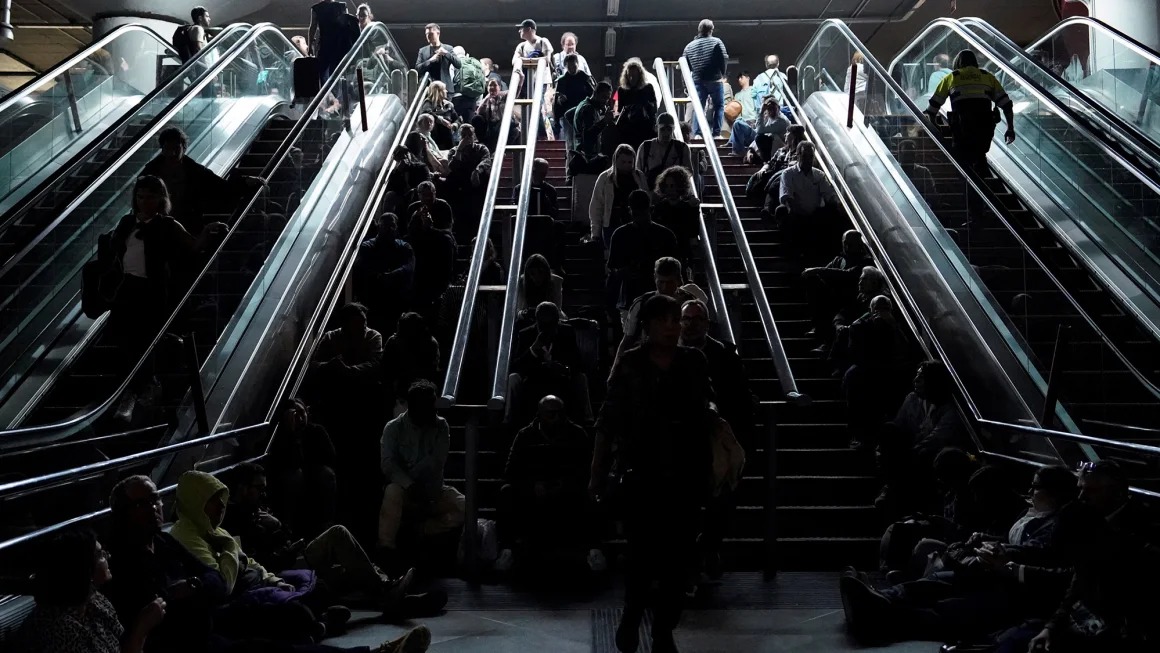Original article (in Albanian) was published on 12/05/2025; Author: Patris Pustina
Claim: The massive power outage that occurred in Spain and Portugal on April 28 was caused by solar energy
Verdict: Lacks context
Following the sudden power outage in Spain and Portugal on April 28, 2025, some Albanian-language media outlets reported that solar energy was to blame.

However, the articles clarify that the Spanish electricity transmission system operator, REE (Red Eléctrica de España), ‘was not able to determine the origin of the two ‘events’, meaning what exactly caused them.’
Additionally, ‘REE admitted that the cause of the two ‘events’ that led to the system collapse is believed to have originated in the southeastern part of the peninsula, in the Extremadura region. This area is one of the country’s top electricity producers, due to its concentration of hydroelectric and solar power plants, as well as Spain’s most powerful nuclear facilities. The head of REE stated that it is ‘possible’ the cause lies in the photovoltaic systems’
It is true that Eduardo Prieto, head of Red Eléctrica (REE), confirmed that the two seemingly unrelated incidents, which occurred within 1.5 seconds of each other in southwestern Spain, disrupted the grid’s frequency. He explained that this disruption led to the shutdown of thermal power plants with a capacity of 15 gigawatts (GW) — nearly half of the thermal generation capacity operating at that moment.
Significant and sudden deviations can trigger a cascading failure, where extreme frequency fluctuations activate components and mechanisms in other thermal power plants (as well as major consumers), which then automatically disconnect these plants from the grid.
Prieto indicated that it is quite likely this domino effect was initiated by solar power plants.
Does this suggest that the power outage was caused by an ‘overproduction of solar energy, combined with an issue in balancing the amount of energy fed into the grid and the energy drawn by consumer demand’?
The cause of the power outage has not been definitively determined. At the time of the incident, solar energy was providing approximately 60% (19.3 GW) of the available electricity in the Spanish grid. It appears that solar power plants were dominating electricity generation in southwestern Spain.
Photovoltaic systems are not meant to shut down abruptly, according to standard EU regulations for electricity producers that have been in effect since 2016.
These regulations require photovoltaic systems to gradually reduce their output if the grid frequency exceeds the limit of 50.2 Hz due to an energy surplus.
In Spain, the relevant guidelines for grid connection were introduced in the late 2000s to ensure that photovoltaic systems do not disconnect from the grid in the event of a sudden network fault’, said Sönke Rogalla, a researcher at Germany’s Fraunhofer ISE Institute, the largest solar research institute in Europe, in a statement to DW. He noted that these features are tested prior to operation as part of the certification process.
Current data indicates that even if all solar power plants had been disconnected from the grid at the same moment, the shortfall wouldn’t have been 15 GW but at least 20.4 GW, since photovoltaic output at the time of the blackout was at least 17 GW. Additionally, nuclear power plants supplying 3.4 GW were also disconnected as a precaution.
It has been documented that during the outage, Spain’s electrical interconnections with France and Portugal were limited. However, it is still unclear whether this was the cause of the outage in Spain or one of the resulting domino effects.
What is certain is that Spain was exporting a net total of 3 GW just before the grid disconnection. When the power lines went down, this surplus suddenly became available within Spain. An event like this would inevitably place a heavy strain on any power grid.
Fraunhofer researcher Sönke Rogalla acknowledged that this could have played a role in the blackout but offered a broader perspective:
‘The power outage in Spain wasn’t a failure of the photovoltaic system, but likely a failure of the system itself’, he said, adding, ‘in that sense, I see it as a strong reminder that the restructuring of the energy system presents major challenges’.
With current infrastructure, it is not yet possible to run an electrical grid solely on solar and wind power, he noted.
Germany’s outgoing government has outlined a possible way forward in an action plan. Meanwhile, the EU’s regulatory body, the Agency for the Cooperation of Energy Regulators (ACER), has already presented a proposal for the implementation of new solutions at the EU level. Beatriz Corredor, president of Red Eléctrica Española (REE), stated in an interview that blaming the high share of renewables for the outage in Spain is a mistake.
‘These technologies are now stable and have systems that enable them to function like conventional generation systems without any safety concerns’, she said.
In a press conference, Spanish Prime Minister Pedro Sánchez dismissed claims that renewable energy was to blame for the outage as ‘lies’, criticizing those who linked the blackout to Spain’s use of wind and solar power.
‘Those who associate the blackout with a lack of nuclear energy are either lying or revealing their ignorance’, he said.
In conclusion, the theory that an ‘excess of solar energy’ caused the power outage has not been proven.
Renewable energy proponents emphasize that solar and wind power are reliable energy sources that contribute to energy security.
Stephen Jarvis, assistant professor of environmental economics at the London School of Economics and Political Science, was tracking grid changes as Spain worked to restore power. He noted that solar, wind, and hydroelectric energy were still providing electricity in Spain, while nuclear, gas, and coal power were completely offline.



